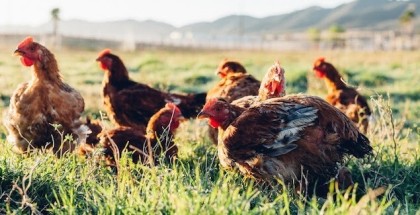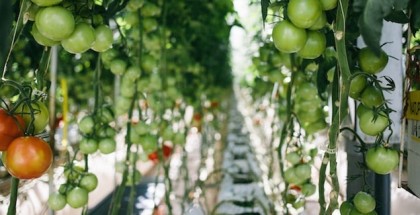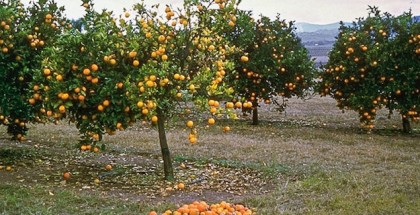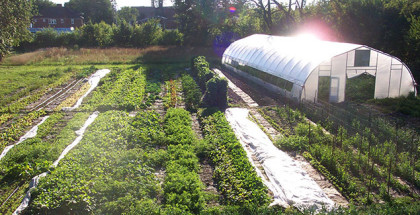Uncategorized
Pasture-raised Livestock Operation in Murrieta, CA Finds Success by Getting People to the Farm
April 12, 2016 | AJ Hughes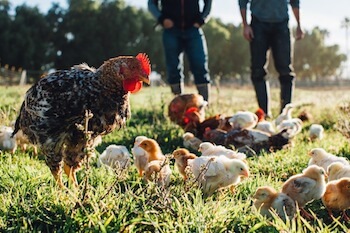
Murrieta, CA-based Primal Pastures is a family farm that sells pasture raised chicken, pork, lamb, beef, honey, and wild seafood. (Photo Credit: Kathi Bahr)
“We’re trying to take farming practices back 100 years, but put the business model 10 years ahead,” says farmer Paul Greive of Murrieta, CA-based Primal Pastures.
Greive and three of his in-laws founded Primal Pastures in 2012, starting with pastured free-range chickens. The small family farm has since expanded its offering and, in addition to poultry, now sells pasture raised pork, lamb, beef, honey, and wild seafood to its customers.
Primal Pastures is not an organic farm, but Greive takes pride in the fact that he and his fellow farmers employ regenerative and environmentally responsible farming practices that “go beyond sustainability.” Read More
USDA Offers New Toolkit to Help Communities and Businesses Assess Economic Impact of Local Foods
March 28, 2016 | USDA USDA News Release — Agriculture Secretary Tom Vilsack today unveiled a new resource created by the U.S. Department of Agriculture (USDA) and Colorado State University that will help communities and businesses evaluate the economic benefits of investing in local food systems. The Secretary released details about “The Economics of Local Food Systems: A Toolkit to Guide Community Discussions, Assessments and Choices” in his keynote remarks at the 12th Annual Good Food Festival and Conference in Chicago. Read More
News Release — Agriculture Secretary Tom Vilsack today unveiled a new resource created by the U.S. Department of Agriculture (USDA) and Colorado State University that will help communities and businesses evaluate the economic benefits of investing in local food systems. The Secretary released details about “The Economics of Local Food Systems: A Toolkit to Guide Community Discussions, Assessments and Choices” in his keynote remarks at the 12th Annual Good Food Festival and Conference in Chicago. Read More
Value-Added Products from Citrus Jam to Goat Milk Soap Fuel Local Food Movement in Riverside
March 22, 2016 | AJ Hughes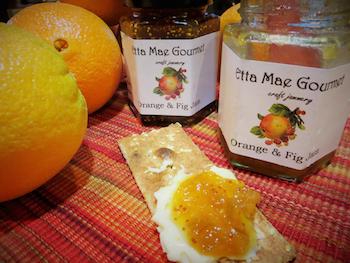
Orange & fig jam is one of many flavors offered by Riversidebased Etta Mae Gourmet. (photo courtesy Laura GoalenAnderson/Etta Mae Gourmet)
For centuries, artisans have added value to agricultural produce. Today, soap made from locally sourced goat milk and jam made with citrus sourced from local groves are among numerous value-added items available in Riverside, California.
Laura Goalen-Anderson of Etta Mae Gourmet and Janice Lake of Goat Rodeo Soap took different routes toward becoming value-added entrepreneurs, and both are passionate about providing quality products that include ingredients grown and raised locally.
Goalen-Anderson has always liked to cook, and making jams is one of her main culinary interests. In 2013, the Riverside Food Co-op approached her to see if it could offer her jams to its members. She was delighted to be included, and her local “craft jammery” in downtown Riverside was born. She named the business after her grandmother, Etta Mae, who each year made strawberry jam and orange marmalade. Read More
Original Water System that Spawned Riverside Citrus Industry Remains Key to City’s Local Food Future
March 21, 2016 | AJ Hughes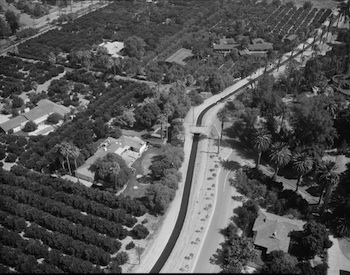
The Gage Canal became a reality in the late 19th century, and was a key factor in making Riverside a major citrusgrowing area. (Wikimedia Commons photo)
Riverside, California and its relationship with water goes all the way back to its founding in the early 1870s, when the city was named for its close proximity to the Santa Ana River. In present times, access to water and water policy can seem like a complicated maze, one best solved by examining the city’s geography and history.
The 96-mile-long Santa Ana River, the largest river in Southern California, begins in the San Bernardino Mountains and flows through Riverside and Orange county before emptying into the Pacific Ocean. The Santa Ana River Basin is massive, spanning 2,650 square miles in four counties.
Riverside uses precipitation that winds up in this basin for its water supply, as much of it is collected in 54 wells operated by Riverside Public Utilities.
The city is the birthplace of the California citrus industry, which came to fruition only because of newfound water sources. Read More
Experts Weigh in: While Hydroponic Growing Techniques Offer Incredible Benefits, We Still Need Dirt
March 16, 2016 | AJ Hughes
Tomato plants grow in the soil. (Wikimedia Commons photo)
Traditionally, farmers have grown plants in nutrient-rich soil. Now an increasing number of growers are utilizing hydroponic growing systems, which use a variety of soil-less media in a controlled environment.
But which is better—soil or soil-free?
Seedstock ventured to find an answer to this question by talking to a farmer, a hydroponics expert, a horticulturist and a chef. They each have different opinions, but one thing is clear: while soil-less growing techniques can offer incredible benefits, we still need dirt.
Here’s what they had to say. Read More
Spring in California is Time to Inspect Citrus Trees for Asian Citrus Psyllid
March 7, 2016 | UC ANR NewsNews Release – A tell-tale sign of spring in California is a flush of new leaf growth on citrus trees. Because the feathery light green leaves are particularly attractive to Asian citrus psyllids (ACP), the leaves’ emergence marks a critical time to determine whether the pest has infested trees.
“We encourage home citrus growers and farmers to go out with a magnifying glass or hand lens and look closely at the new growth,” said Beth Grafton-Cardwell, UC Agriculture and Natural Resources (UC ANR) citrus entomologist. “Look for the various stages of the psyllid – small yellow eggs, sesame-seed sized yellow ACP young with curly white tubules, or aphid-like adults that perch with their hind quarters angled up.” Read More
Sustainability and Rural, Urban Collaboration Key to Agriculture Economy in California, Says UCANR Head
March 3, 2016 | Rose Egelhoff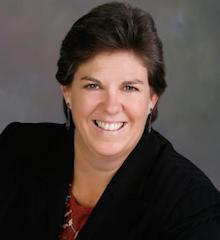
Dr. Glenda Humiston Vice President UC Agriculture and Natural Resources (UCANR).
Dr. Glenda Humiston has been Vice President of the University of California Division of Agriculture and Natural Resources (UCANR) for seven months, but she has been on farms throughout her life.
Growing up, Dr. Humiston’s family’s farm was just over 300 acres, with a small dairy, cow-calf operations, crops and a home garden to feed the family. But her parents had to work off-farm to make ends meet.
“It was a typical family farm story back then,” she says.
Dr. Humiston’s parents’ struggle fueled her interest in farm policy, an interest that was cemented during a Peace Corps stint in Tunisia where she helped set up a large, California-style dairy in an area without the infrastructure. Read More
Study Finds Two Thirds of Urban Farmers Have a Social Mission that Goes Beyond Food Production
March 2, 2016 | seedstockNews Release – Two thirds of urban farmers have a social mission that goes beyond food production and profits, finds new research led by NYU Steinhardt School of Culture, Education, and Human Development.
The study, published in the British Food Journal, shows that three of the four top reasons farmers grow in urban areas – food security, education, community building, and producing food for the market – have social motivations.
As urban populations grow in the United States, farming in cities is becoming more common. While food entrepreneurs seek to make money through urban farming, many urban farms are concerned with factors beyond food production, and have incorporated social goals into their missions. These missions align with a larger social movement in food – the “good food movement” – that focuses on where food comes from, who grows it, and how it’s grown. Read More

